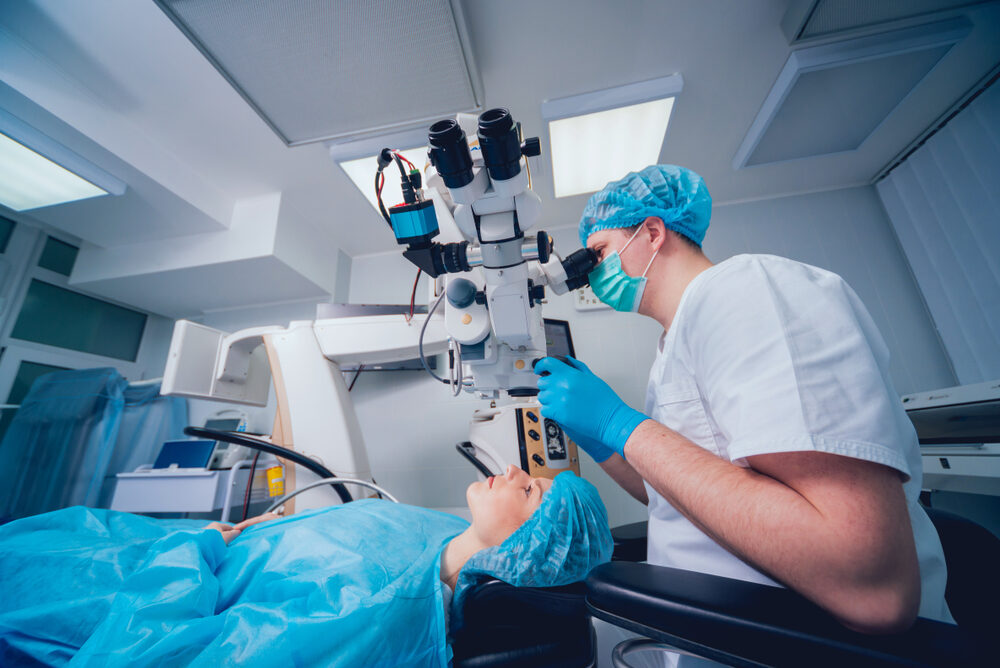
☝️ The most important facts in brief
- To work as an ophthalmologist, you need a degree in medicine and specialist training in ophthalmology.
- Ophthalmologists diagnose and treat eye diseases such as cataracts and glaucoma. They prescribe visual aids such as glasses or contact lenses.
- As a specialist in ophthalmology, you can work in an ophthalmological practice, an eye clinic or in research and teaching. The demand for ophthalmologists is high.
- The earning potential of an ophthalmologist is attractive, which is also an argument in favour of this profession.
📖 Table of contents
The profession of ophthalmologist is demanding and offers many attractive career opportunities. A degree in medicine and specialist training in ophthalmology are required. Ophthalmologists work in surgeries or clinics and help people to maintain their eyesight.
Are you interested in studying medicine?
We will be happy to advise you free of charge about your options for studying medicine, including advice on studying medicine in another EU country, which is fully recognised in Germany.
What exactly is an ophthalmologist?
A specialist in ophthalmology is a doctor who specialises in the eye and has undergone appropriate further training in the field of ophthalmology after completing their studies.
As an ophthalmologist, you can work in a clinic, be employed in an ophthalmological practice or be self-employed with your own practice.
The job description includes activities in the areas of prevention, diagnostics, treatment and surgery. In most cases, the aim is to maintain or improve the patient's vision.
Precaution
Preventive care is very important in ophthalmology. Through regular examinations, the ophthalmologist ensures that eye problems and diseases are recognised at an early stage. This often happens even before patients notice any symptoms.
Specialists in ophthalmology carry out eye tests and eye checks. These check-ups are crucial for long-term eye health. Even people without symptoms should visit an ophthalmologist regularly to ensure that everything is in order with their eyes.
Diagnosis
One of the central tasks that an ophthalmologist must perform conscientiously is diagnostics. Both when people visit the practice with complaints and as part of a preventive examination, it is important to recognise eye diseases so that they can then be treated correctly.
Treatment
As an ophthalmologist, you prescribe visual aids such as glasses and contact lenses to effectively correct patients' visual problems. For more complex diseases, you will draw up treatment plans and carry out the appropriate measures. Nowadays, modern technologies make it possible to treat many eye diseases and malfunctions very effectively.
Operation
Ophthalmologists can perform surgery to correct visual problems. This is most often the case with cataracts and glaucoma. The Surgery Eye surgery requires precise knowledge and specialised training. As with most other treatments, the aim of eye surgery is usually to improve or restore the function of the eye.
What training do prospective ophthalmologists have to undergo?
Before you can use the job title "Specialist in Ophthalmology", you must undergo extensive training and specialisation. This includes studying human medicine and then training to become a specialist. In total, it takes at least 11 years after graduating from high school before you can pursue your dream job as an ophthalmologist.
Before specialising in ophthalmology, you need to study human medicine
Before you can even begin to specialise in the "eye" organ, you have to complete a full degree in human medicine. Here, future doctors learn a lot about people, their bodies, metabolism and diseases from a wide range of specialisms. Ophthalmology is just one of many specialisms.
In Germany, the medical degree programme concludes with the state examination. This is another extensive examination to check whether you fulfil the requirements for working as a doctor and are equipped with the necessary knowledge.
Incidentally, Latin is no longer essential for studying medicine, as you can also learn it during the first semesters. A very good Abitur, on the other hand, is a great advantage, because unlike in many other countries, a significant proportion of admissions in Germany are still based on the so-called Abitur best quota.
Why you need to know about other specialisms as an ophthalmologist
You may be wondering why you have to go through all medical specialisms during your studies if you already know that you want to become an ophthalmologist. You may feel that the compulsory clinical traineeships and the practical year are too far removed from your chosen specialism. After all, prospective medical specialists don't have to learn very much about internal medicine, pathology and ophthalmology. Radiology know - or do you?
Many eye diseases are related to general health problems. Diabetes, for example, can cause visual impairment. A comprehensive knowledge of medicine helps with diagnosis and treatment. In some cases, it can even save lives when ophthalmologists recognise problems that require referral to a doctor in another speciality. It is therefore important that you familiarise yourself with all relevant areas during your studies. Knowledge of all areas is comprehensively tested during your studies and in the final state examination.
Everything to do with the eye - training to become a specialist in ophthalmology
During your specialist training, you will usually work as an assistant doctor at a clinic. During your training as an ophthalmologist, which lasts at least 5 years, you will acquire specific specialist knowledge and practical skills. You will even perform minor procedures under the guidance of experienced specialists. For example, as a trainee ophthalmologist, you will be able to remove the cloudy lens in cataracts and insert an artificial lens in its place.
As training to become a specialist in ophthalmology is a part-time programme, it is a major challenge for prospective ophthalmologists: You have to study for the specialist examination and attend additional seminars at the same time, as well as mastering your everyday life in the clinic.

Career and salary: What does an ophthalmologist earn?
Of course, money should not be the primary motivation for working as an ophthalmologist. However, it cannot be denied that it does play a role for most doctors. If you want to become an ophthalmologist, it is therefore useful to know about the usual income during the various stages of your career.
During your studies
As a student, you do not receive any remuneration. On the contrary: you even have to pay semester fees, which is why many students have to look for a job to finance their life and their expenses. This double burden is a real challenge. The appeal of studying medicine therefore does not initially lie in immediate financial benefits, as these are not available. The path to becoming an (eye) doctor therefore requires far more stamina and resilience than is the case with most other professions.
During specialist training
During their specialist training as an ophthalmologist, trainee specialists are employed as assistant doctors. The salary of an assistant doctor in Germany varies depending on the clinic and collective agreement. On average, the gross salary is between 4,500 and 5,500 euros per month. Your earnings can increase with experience and further training.
As a trained specialist in ophthalmology
Once you have completed your specialist training, your salary increases significantly. Depending on whether you work as a trained ophthalmological specialist in a clinic, in a group practice or as an ophthalmologist in private practice, your income can vary greatly.
Employed ophthalmologists in Germany earn approximately 7,500 to 9,000 euros per month. If you become self-employed with your own practice, your earnings can increase significantly under certain circumstances. However, self-employed ophthalmologists also accept a higher risk because they are responsible for many costs and the profitability of their practice themselves.
All in all, the challenging job of an ophthalmologist offers attractive financial prospects.
Personal requirements that ophthalmology specialists should fulfil
In addition to the professional requirements, there are also some demands on your personality that you should not underestimate. Although ophthalmologists are exposed to far fewer emergencies than surgeons, for example, stressful situations can still arise in which your ability to work under pressure and act reliably for the patient are essential. The following qualities are therefore required:
- Serious interest in the well-being of your patients and a corresponding commitment
- Correct processing of information even in stressful situations
- A lifelong desire to learn and continuous further training, because ophthalmology is constantly evolving through good research
- Fine motor skills, which are particularly important during eye surgery
Specialisation in certain areas of ophthalmology
Ophthalmology offers a wide range of specialisation options that significantly increase career opportunities. A specialist in ophthalmology can focus on various sub-areas and become a specialist in their field through targeted further training.
Retinal surgery
If you specialise in retinal surgery, you will dedicate yourself to the treatment of diseases such as retinal detachment or diabetic retinopathy. You will then carry out very precise procedures that must be performed with great care and the appropriate expertise.
Glaucoma specialist
Another important sub-area is the treatment of glaucoma. Ophthalmologists who specialise in this area monitor intraocular pressure and carry out appropriate surgical procedures.
Refractive surgery
Refractive surgery deals with the surgical correction of visual defects. As an ophthalmologist working in this field, you will insert lens implants or use a laser to correct visual disorders such as short-sightedness or long-sightedness.
Paediatric ophthalmology
Paediatric ophthalmology is another exciting speciality. Here, ophthalmologists treat visual problems and eye diseases in children. This activity requires special empathy and specialised knowledge.
Oncological ophthalmology
In oncological ophthalmology, specialists focus on the diagnosis and treatment of eye cancer. This speciality requires close collaboration with oncologists and special training in the latest treatment options.
Dry eye and surface surgery
Chronic dryness of the eye is not only unpleasant, but can cause far more problems in the long term. It is therefore important that the ophthalmologist finds reliable ways to keep the eyes moisturised. Superficial corneal surgery is another important speciality.
Ophthalmologist with or without a doctorate?
Ultimately, a doctorate says nothing about your specific skills as an ophthalmologist. However, it can open doors for you, especially if you want to work in research.
Strictly speaking, however, there is no such thing as a "Doctor of Ophthalmology", only the general title "Doctor of Human Medicine". This means that the addition "Dr" for ophthalmologists does not necessarily mean that they have also completed a doctorate in their current speciality. The doctoral thesis can, for example, also be in the field of liver diseases, the Gynaecology or in a similarly distant specialism. Many doctors begin their doctoral thesis during their studies and therefore at a time when they often do not yet know exactly how their career will develop and in which specialism they will ultimately end up.
Ultimately, however, this plays a subordinate role, as the doctorate is primarily intended to show that you have already worked scientifically. If you are interested in a position in science, universities can make sure that you already have the basic skills.
Free information material
Studying medicine abroad 🎉
Order your info pack now, find out more about the Studying medicine abroad and get started as a medical student!





